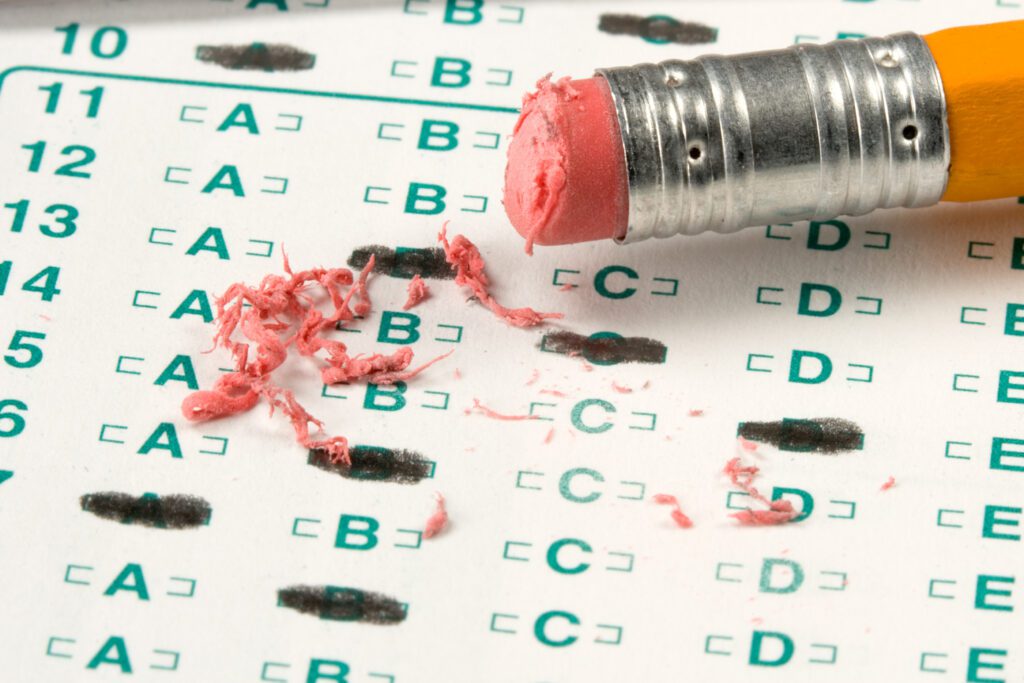The thought of an upcoming test can cause stress for many students.
Whether it’s exam season or a unit test in a particular subject, most students feel at least a bit of nervousness before a test. But for some students, the issue goes beyond simply “feeling nervous” about taking a test.
For these students, the thought of a test can cause overwhelmingly negative emotions that harm their ability to perform.
This is “test anxiety”.
What exactly is test anxiety?
Test anxiety can be both mental and physical, leading students to experience higher levels of stress, difficulty concentrating, and feelings of dread during or before taking a test.
Feeling a little nervous before a test is normal. However, for some students, the feelings of dread and inability to concentrate can have a big impact of their test performance—even if they have studied the material.
Along with poor test performance and grades, test anxiety can also affect a student’s attitude toward school. Since many students with test anxiety perform poorly, they may start to feel frustrated and overwhelmed by school. This can lead to a cycle of bad grades and low self-confidence that can be hard for students to break free of.
Causes of test anxiety
Common causes of test anxiety include:
- Expectation of poor outcome
- High expectations
- Poor grades and confidence
- Increased pressure
Going into a test with the expectation of getting a bad grade can cause additional stress, and actually cause the poor outcome the student expects.
Having high expectations can cause high levels of stress on a student, leading the student to overwhelm him or herself with additional pressure.
Performing poorly can create even more test anxiety in a student, creating a cycle of low confidence and the expectation of getting a bad grade that he or she carries into future tests.
The time limits imposed on tests can cause students to feel overwhelmed and unable to concentrate, leading to a poor grade that confirms the student’s fear of failure.
Symptoms of test anxiety
If your child is performing poorly on tests, even though he or she knows the material, he or she may be struggling with test anxiety. Keep an eye out for these symptoms:
- Excessive worrying
- Avoiding studying
- Lack of confidence
- Association between grades and personal worth
- Panic during tests
Thinking about an upcoming test is enough to cause stress for your child.
Your child procrastinates studying for the test until he or she absolutely has to.
Even after studying the material, your child still feels unprepared and worries about getting a bad grade.
Your child places his or her sense of worth on the grades he or she achieves on tests and in school.
Your child shuts down when taking tests, and is unable to recall information he or she has studied.
How To Reduce Test Anxiety
Check out these 8 tips to overcome test anxiety so your child can start to improve his or her test experience and performance.
- Have a positive attitude
- Start studying early
- Be prepared
- Find ways to relax
- Get a good night’s sleep
- Eat a nutritious meal before
- Avoid cramming before the test
- Don’t expect to be perfect
Help your child avoid falling into a pattern of negative thinking when he or she has an upcoming test. Turn negative thinking (“I’m going to fail this test”) into encouraging words (“I am prepared for this test”) that your child can say to him or herself as test day approaches.
Start studying well before the date of the test. Cramming for a test will only create more anxiety, so make sure your child starts studying early enough that he or she has time to review all the material. These 8 memory techniques can help your child have a successful study session for his or her next test.
Find out what the test will cover, and what format it will be in (multiple choice? Fill in the blank?). This will help your child gather the information he or she needs to review, and can help avoid missing any topics or material.
Create a study space where your child is comfortable and can relax while he or she studies. Practice relaxation techniques that he or she can use on test day and during the test to reduce anxiety, like taking deep breaths.
Make sure your child gets at least 8 hours of sleep the night before the test. Staying up late to study will only mean he or she will be more tired the next day, which can affect memory and test performance.
Taking a test on an empty stomach can lead leave students feeling tired and distracted. Prepare a healthy breakfast or lunch to eat before the test so your child has the energy needed to perform his or her best.
Cramming is never the most effective way to study—and that includes the last-minute scramble to review material in the minutes before the test. Encourage your child to take a break leading up to the test so his or her brain has a chance to relax and recharge beforehand. If he or she has prepared effectively, the information will still be there when it comes to test time.
Going into a test with expectations of perfection can set your child up for additional (and unnecessary) stress. Let your child know it’s ok not to be perfect—whatever mistakes he or she makes can be a learning experience for next time.
Reducing test anxiety starts with developing good study habits and proper preparation. If your child is struggling, our Study Skills tutoring program can help!
Be your child’s biggest cheerleader—access our study skills guide.







